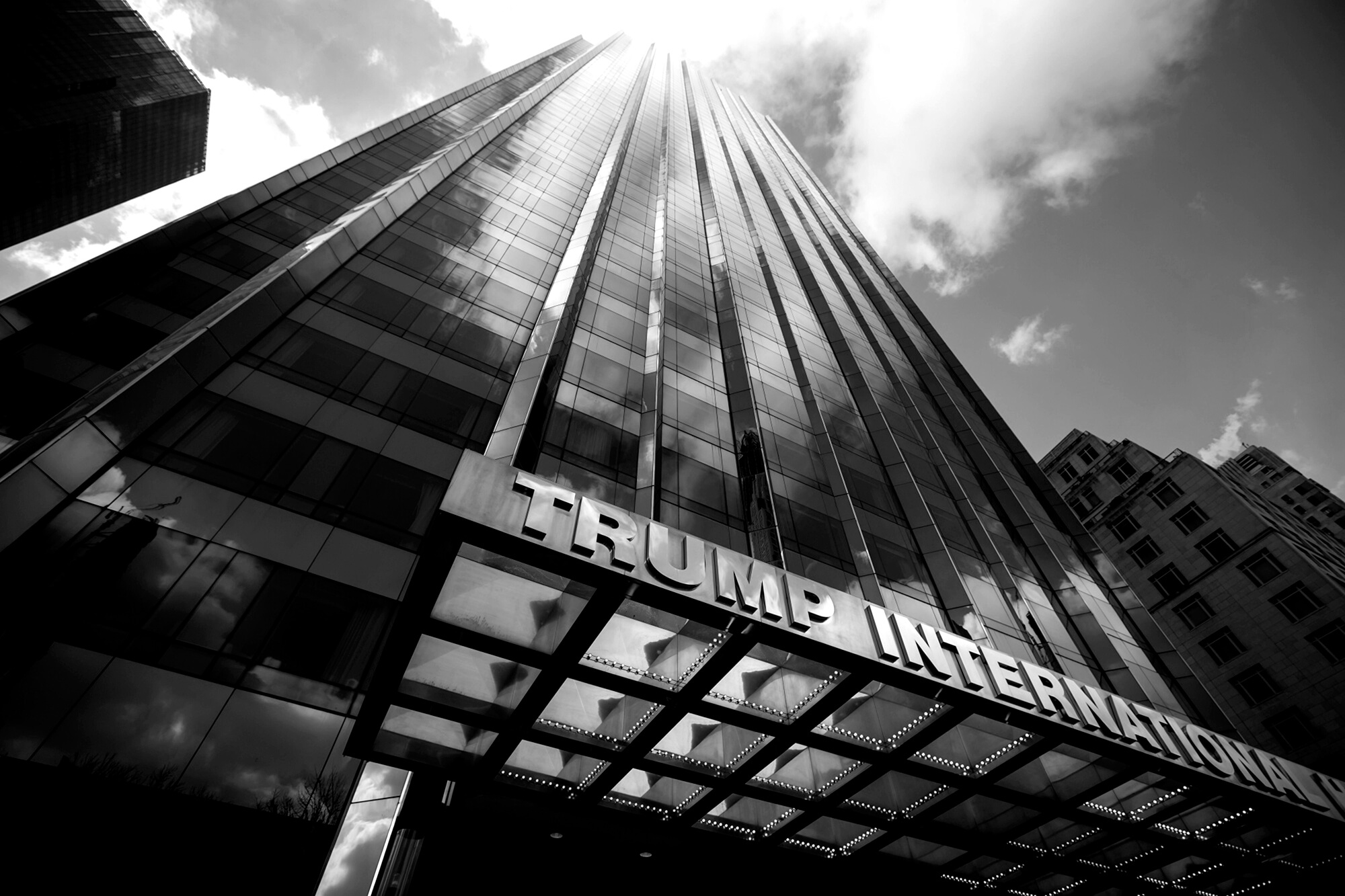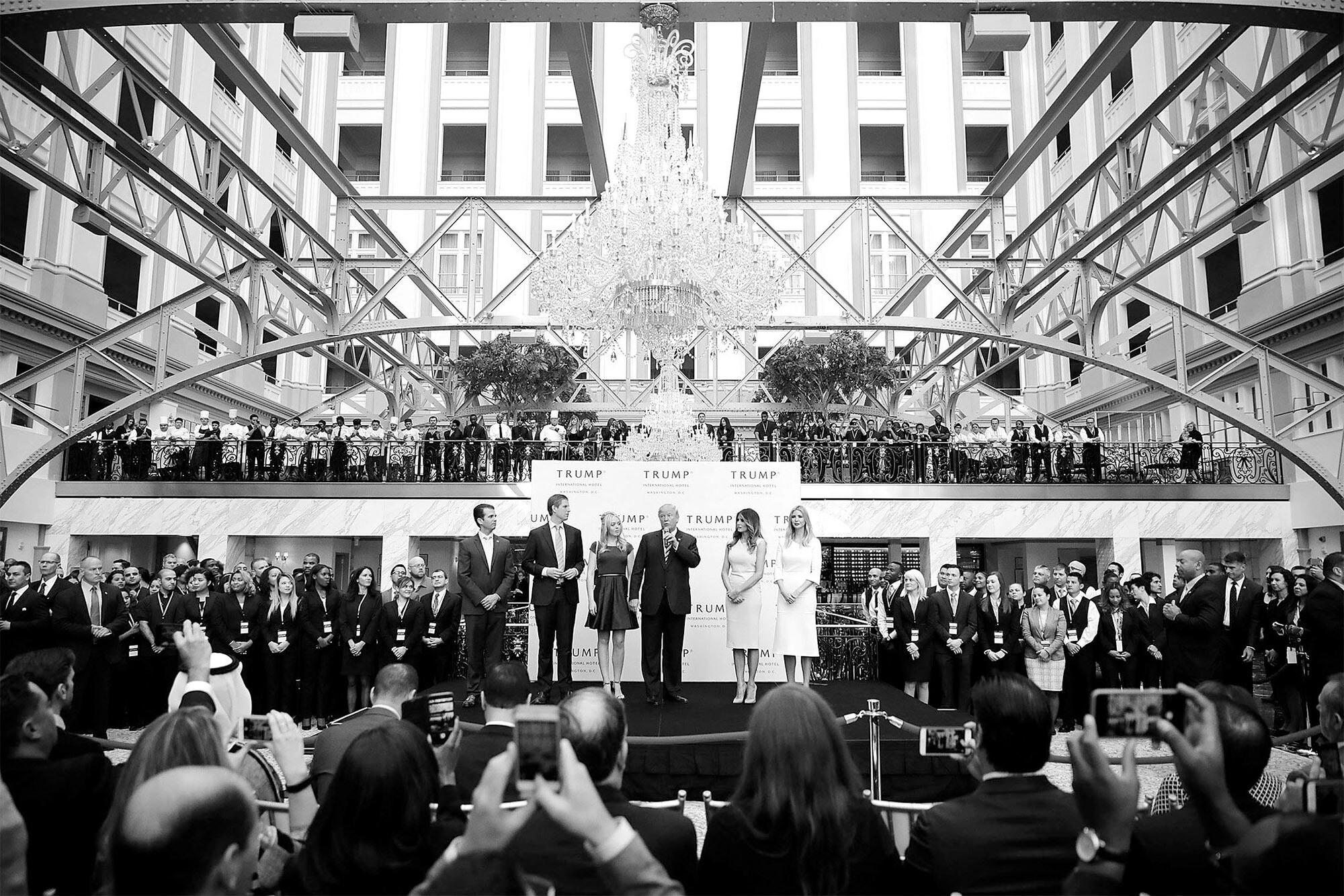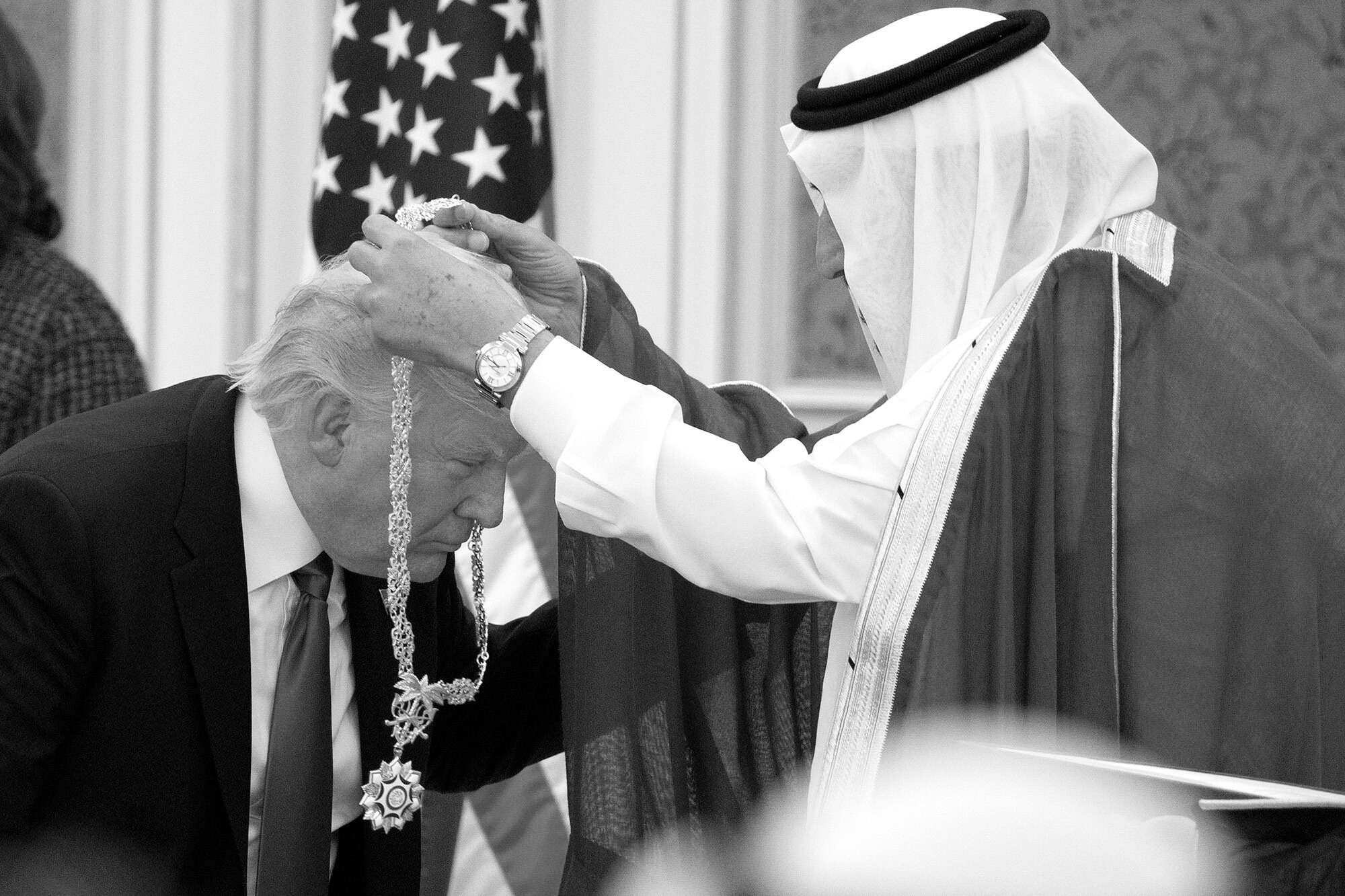Editorial

Trump International Hotel & Tower, New York, March 2019. Donald Trump was riddled with conflicts of interest throughout his time in office and abused the presidency to enrich himself and his family. His refusal to divest from his businesses resulted in him violating the constitution by indirectly receiving money from foreign governments.
Trump International Hotel & Tower, New York, March 2019. Donald Trump was riddled with conflicts of interest throughout his time in office and abused the presidency to enrich himself and his family. His refusal to divest from his businesses resulted in him violating the constitution by indirectly receiving money from foreign governments. Michael Nagle / Bloomberg
Who owns the president?
As soon as Donald Trump took his hand off Abraham Lincoln’s Bible on Jan. 20, 2017, he broke the oath he had just taken to protect and defend the Constitution of the United States. Never before had the United States elected a president with a sprawling business empire — one that he insisted on keeping ownership of while in office — and Trump stood to have his private organization profit directly from the US government as well as foreign nations while serving in office.
That’s why, within three days of Trump’s being sworn in, Citizens for Responsibility and Ethics in Washington filed a lawsuit against the president to prevent him from illegally receiving money from foreign governments. The violation in question was the foreign emoluments clause of the Constitution, which bars presidents from receiving money or gifts from other nations. And Trump was certainly on the path to breaking the law: Shortly after he won the election in 2016, the Saudi government funneled hundreds of thousands of dollars into his Washington, D.C., hotel by booking 500 of its rooms for their lobbyists.

Donald Trump abused the presidency to enrich himself and his family. His business dealings also raised questions about whether he was truly representing the nation’s interest or his own. The government of Saudi Arabia made more than $270,000 in payments to the Trump Hotel after his election, just a few months before he finalized one of the largest arms deals in US history with the kingdom. Chip Somodevilla / Getty Images
Pocketing money from foreign governments, whether directly or otherwise, presents exactly the kind of situation that the Founders did not want the president to be in. And that’s because the president might show undue deference to an adversarial government, putting his or her own interests ahead of the nation’s.
Take Saudi Arabia’s payments to the Trump Hotel, which totaled $270,000 between November 2016 and February 2017. Those payments came just a few months prior to Trump finalizing one of the largest arms deals in US history with the kingdom. He also later went on to protect the Saudi crown prince, Mohammed bin Salman, after the brutal killing of Washington Post columnist Jamal Khashoggi. “I saved his ass,” Trump bragged to the journalist Bob Woodward, in reference to bin Salman. “I was able to get Congress to leave him alone. I was able to get them to stop.”
It wasn’t just the hotel payments; Saudi Arabia was still paying the Trump Organization tens of thousands of dollars a year for the floor in Trump World Tower that it purchased for $4.5 million in 2001. This is not to say it’s been proved that Trump acted the way he did with Saudi Arabia because of his business ties with them. But it is to say that the Saudis’ money may have, in fact, influenced him. After all, Trump, who was suffocating in debt, probably appreciated the payments, and he certainly didn’t discourage the Saudis from patronizing his businesses.

Saudi King Salman presented President Donald Trump with the highest civilian honor, the Collar of Abdulaziz Al Saud, at the Royal Court Palace, in Riyadh. President Trump bragged about having protected the Saudi crown prince, Mohammed bin Salman, after the brutal killing of Washington Post journalist Jamal Khashoggi. Evan Vucci / AP
Yet despite all of this, Trump faced no legal consequences and was able to continuously violate both the foreign and domestic emoluments clauses throughout his time in office. And that’s because the lawsuit that CREW filed dragged on for four long years. (It was initially dismissed on the grounds that the plaintiff had no right to sue the president, a decision that was reversed on appeal, and was finally dismissed by the Supreme Court only after Trump left office.) All the while, Trump visited his properties hundreds of times — charging taxpayers for the Secret Service’s use of them — and many foreign officials spent their money at his hotels.
That’s just scratching the surface of Trump’s unprecedented conflicts of interest. He was also hundreds of millions of dollars in debt — to whom, the public only partially knows. That’s why Congress ought to ensure that future presidents have as few conflicts of interest as possible. And in order to do that, it should start with two reforms.
"Congress ought to ensure that future presidents have as few conflicts of interest as possible."
The first is to require all future presidents to divest themselves of their businesses and other assets that could pose a potential conflict of interest. The reason for this is simple: No matter how well intentioned a president is, their financial self-interest is bound to cloud their judgment, wittingly or otherwise, when making decisions that affect the whole nation. And though divestment may be perceived as an extreme solution — with some arguing that it would discourage successful businesspeople from running for president and therefore limit the talent pool — it would dramatically reduce the potential for presidents to be in bed financially with foreign adversaries, precluding the need to legally enforce the emoluments clause while someone is in the White House.
The second is to require all future presidents to publicly release their tax returns. Transparency is key to preventing corruption, especially in a democracy. Tax returns would provide far greater insight into a candidate’s potential conflicts of interest, and voters could then decide for themselves whether the candidate was too prone to act in his or her own self-interest. That electoral threat alone could deter would-be presidential candidates from running for office prior to eliminating their financial conflicts of interest.
Before Trump, every president since Jimmy Carter had disclosed their full tax returns in an effort to be transparent about any potential conflicts of interests upon entering office. But that tradition was merely a norm, and because norms are generally enforced by the desire to avoid being shamed, Trump easily maneuvered his way out of it by being himself: shameless. And in resisting the public pressure to release his tax returns, Trump has now set a precedent that candidates do not, in fact, have to release their tax returns. (This has already proved to be the case; in the 2020 Democratic primaries, billionaire Mike Bloomberg followed Trump’s lead and failed to disclose a fully transparent financial report.)
That’s why this norm should be turned into law by Congress.
Of course, transparency alone can only go so far. The public knew, for example, that Trump owned hotels where foreign dignitaries could stay, but that knowledge didn’t prevent him from indirectly receiving money from foreign governments by those means. And Trump’s tax returns — leaked to the press in 2020 — did finally get a public viewing, and yet over 74 million voters chose to vote for him anyway. Saving our democracy from corruption will always rely in part on voters taking conflicts exposed in financial disclosures seriously.
The same is true for divestment: Though it would have dramatically limited Trump’s conflicts of interests, some conflicts, whether political or financial, are always bound to arise given the president’s central role in government. But when they do, the public ought to know, because while Trump was historically corrupt, neither the courts nor Congress held him accountable; in the end, only the voters did.